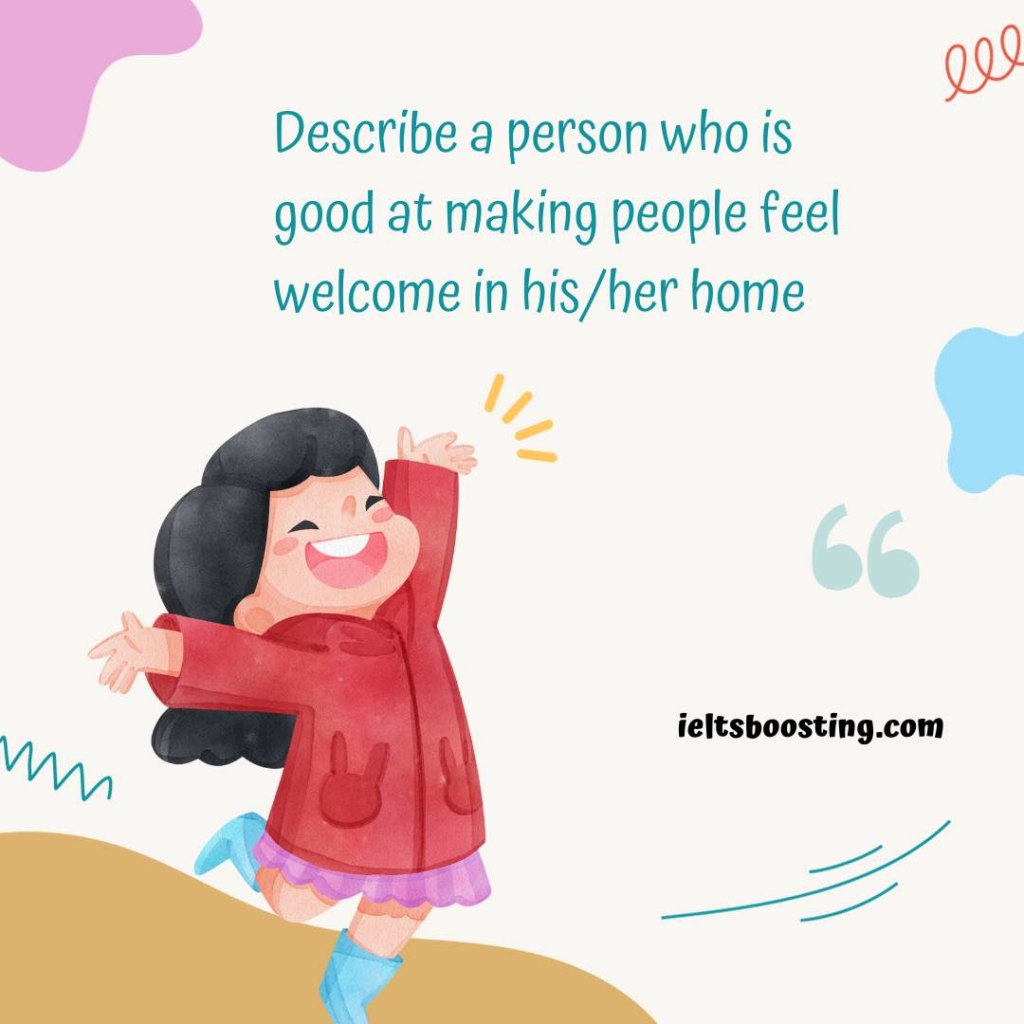Describe a person who is good at making people feel welcome in his/her home
You should say:
Who this person is
When and how you met him/her
How he/she welcomes visitors
And explain why you think he/she is good at welcoming visitors

Describe a person who is good at making people feel welcome in hisher home
Sample answer
I’d like to talk about a colleague of mine on the content creator team who is exceptionally good at making people feel welcome in his home. We’ve been working together for about two years now, and I first met him when I joined the team. He has this warm and inviting personality that really stood out from the beginning. He is an outgoing and sociable person who is ready to help others, including colleagues, friends, or even the underprivileged.
Whenever he has visitors, he goes all out to make them feel at home. He often hosts small parties, which are always a great success. He always prepares plenty of food, and he makes sure to include everyone’s favorite dishes, demonstrating his thoughtful nature. After we’ve eaten, we usually gather in his living room, lounging on the sofas and just gossiping. Sometimes, we sing together; he is a good guitar player. It’s such a relaxed and friendly atmosphere.
What makes him really good at welcoming visitors is his attention to detail and his ability to create a comfortable environment. He remembers little things about people, like their food preferences or topics they’re interested in, and incorporates them into conversations. It’s this personal touch that makes his gatherings so special. You can tell he genuinely enjoys hosting and cares about making everyone feel included and valued.
I admire my colleague for his hospitality and generosity. He is a role model for me and a joy to work with.
Useful vocabulary and collocations
- Exceptionally good: Outstanding or remarkable in ability.
- Content creator team: A group of people who produce creative content.
- Warm and inviting personality: A friendly and welcoming nature.
- Stood out: Was noticeably different or remarkable.
- Goes all out: Puts in maximum effort.
- Make [someone] feel at home: Make someone feel comfortable and relaxed.
- Small parties: Intimate social gatherings.
- Great success: Highly successful or effective.
- Plenty of food: A large amount of food.
- Favorite dishes: Preferred or most liked food items.
- Thoughtful nature: Considerate and attentive disposition.
- Gather in the living room: Come together in a common area of the house.
- Lounging on the sofas: Relaxing comfortably on couches.
- Relaxed and friendly atmosphere: A laid-back and welcoming environment.
- Attention to detail: Careful consideration of every small element.
- Comfortable environment: A setting where one feels at ease.
- Food preferences: Specific likes or dislikes regarding food.
- Incorporates these into conversations: Includes these elements in discussions.
- Personal touch: A unique or individual way of doing something.
- Genuinely enjoys hosting: Truly finds pleasure in having guests.

Describe a person who is good at making people feel welcome in hisher home
Can combine with:
Describe a person you know who likes to talk a lot
Describe a peson who is good at teamwork
Part 3 – Describe a person who is good at making people feel welcome in his/her home
Do people in your country often invite others to their homes? Why?
In my country, it’s quite common for people to invite others to their homes. This practice is deeply rooted in our cultural values of hospitality and community. Inviting someone over is seen as a way of strengthening relationships, whether they be family ties or friendships. It’s also a way to celebrate occasions, share meals, and enjoy each other’s company, reflecting the importance we place on social connections.”
Useful Vocabulary:
- Common: Usual; frequent.
- Rooted in: Based on; originating from.
- Cultural values: Beliefs or principles that are held in high regard by a particular society.
- Hospitality: The friendly reception and treatment of guests.
- Community: A group of people living in the same place or having a particular characteristic in common.
- Strengthening relationships: Making connections with others stronger.
- Family ties: Bonds or connections with family members.
- Friendships: Close relationships between friends.
- Celebrate occasions: Mark special events or times.
- Share meals: Eat food together with others.
- Enjoy each other’s company: Have a pleasant time together with people.
What kind of people do you think are more likely to invite others to their homes?
People who are more sociable and outgoing are often more likely to invite others to their homes. These individuals usually enjoy social interactions and the company of others. They often have a hospitable nature, taking pleasure in making others feel comfortable and welcome in their personal space. Additionally, those who take pride in their homes and enjoy hosting events or cooking might also frequently extend invitations.”
Useful Vocabulary:
- Sociable: Willing to talk and engage in activities with other people; friendly.
- Outgoing: Friendly and socially confident.
- Social interactions: The process of acting and reacting in relation to others.
- Hospitable: Friendly and welcoming to strangers or guests.
- Comfortable: Providing physical or mental comfort; cozy.
- Welcome: Greet someone in a warm and friendly manner.
- Personal space: Someone’s individual environment.
- Pride: A feeling of satisfaction derived from one’s own achievements.
- Hosting events: Organizing and holding events or gatherings.
- Cooking: The practice or skill of preparing food.
Who are more likely to invite others to their homes, people in the countryside or people in the city?
People in the countryside are often more likely to invite others to their homes compared to city dwellers. This tendency can be attributed to the close-knit communities and slower pace of life in rural areas, where there’s a stronger emphasis on personal relationships. In contrast, city life is typically faster and more individualistic, with less space and time for hosting. Rural residents usually have more space and a deeply ingrained culture of hospitality, making them more inclined to welcome guests.”
Useful Vocabulary:
- Countryside: Rural areas outside of cities and towns.
- City dwellers: People who live in the city.
- Close-knit communities: Groups of people in an area who have strong ties to each other.
- Slower pace of life: A lifestyle that is more relaxed and less hurried.
- Personal relationships: Connections between individuals.
- Individualistic: Characterized by independent and self-reliant habits or values.
- Hosting: Inviting and entertaining guests.
- Rural residents: People who live in rural or countryside areas.
- Space: The area that is available for a particular purpose.
- Culture of hospitality: A social custom of being friendly and welcoming to guests or strangers.

Are tourist attractions in the countryside more welcome than those in the cities
Are tourist attractions in the countryside more welcome than those in the cities?
Tourist attractions in the countryside can often feel more welcoming than those in cities, primarily due to their less crowded and more serene environment. The rural settings usually offer a more authentic and peaceful experience, allowing visitors to connect with nature and local traditions. While city attractions are exciting and vibrant, they can sometimes be overwhelming due to their busyness and commercialization. Countryside destinations provide a personal touch, often with local residents eager to share their way of life and cultural heritage.
Useful Vocabulary:
- Serene environment: A calm and peaceful setting.
- Authentic experience: A genuine and true-to-life experience.
- Connect with nature: To feel close or in tune with natural surroundings.
- Local traditions: Customs and practices unique to a particular place.
- Vibrant: Full of energy and life.
- Overwhelming: Overpowering in effect or strength.
- Commercialization: The process of managing or exploiting something in a way designed to make a profit.
- Personal touch: An element of personal involvement and warmth.
- Cultural heritage: The legacy of physical artifacts and intangible attributes of a group or society.
- Eager to share: Keen or enthusiastic about sharing something with others.
What facilities are there in the tourist attractions in your country?
In Vietnam, tourist attractions are well-equipped with various facilities to enhance visitors’ experiences. Most popular destinations, like Ha Long Bay and Hoi An, offer a range of accommodation, from luxurious resorts to traditional homestays. These sites are also known for their delightful culinary options, serving both authentic Vietnamese cuisine and international dishes. Furthermore, visitors can expect to find informative visitor centers, cultural exhibits, and essential amenities like clean restrooms and ample parking.”
Useful Vocabulary:
- Well-equipped: Having the necessary tools, resources, or equipment.
- Accommodation: Places to stay while traveling.
- Luxurious resorts: High-end, expensive lodging options.
- Traditional homestays: Accommodation in a local’s home offering a cultural experience.
- Culinary options: Different choices of food and dining.
- Authentic Vietnamese cuisine: Traditional food from Vietnam.
- International dishes: Food from various parts of the world.
- Informative visitor centers: Places where tourists can get helpful information.
- Cultural exhibits: Displays showing aspects of local culture.
- Essential amenities: Important facilities like bathrooms and parking.
- Clean restrooms: Hygienic toilet facilities.
- Ample parking: Sufficient space for parking vehicles.


